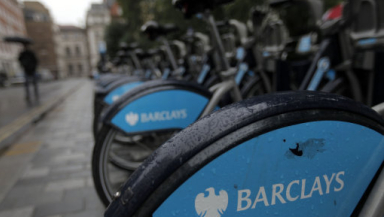
Barclays bank is to allow credit unions to operate out of its branches free of charge.
The plan involves the creation of a £1 million fund to be managed by the east London based charity Toynbee Hall, as well as access to Barclay's 'Pingit' mobile banking service.
Barclays was quoted in the Guardian as saying that their plan would "provide dedicated community hubs that can be used free of charge by credit unions and other community groups".
Credit unions are able to offer more services akin to high street banks, such as debit cards, after the Financial Services Authority decided to relax the rules around their operation.
Smaller numbers are offering cash ISAs and some have branched out into offering mortgages. Most credit unions do not have the infrastructure to offer online banking.
Ashok Vaswani, chief executive of the bank's retail and business banking division, said in the Guardian: "This new commitment will help people who have been historically neglected by the sector, to put them on a more secure footing and give them the chance to fully participate in our economy again."
The credit union sector came to particular prominence last summer when Archbishop of Canterbury, Justin Welby said churches should offer credit unions the use of their buildings, and that Christians with the right experience should volunteer with them.
Archbishop Welby said his ultimate aim was to compete payday loan companies like Wonga out of existence.
In an interview with Total Politics magazine, the Archbishop said: "We've got to have credit unions that are both engaged in their communities and much more professional, and the third thing is people have got to know about them. It's a decade-long process."
The Bishop of Swansea and Brecon, John Davies, who has been an outspoken supporter of credit unions, said to Christian Today that he welcomed the move by Barclays.
"If this is as genuine an offer as it appears, then I welcome it," he said.
"I doubt whether the customers who would seek the support and facilities of a credit union are on the same footing as those who would normally seek the same from a high street bank such as Barclays.
"Barclays appear to be acknowledging a market need for which they do not cater."
Speaking about the need for Christians to support credit unions in the face of loan sharks and payday lenders, Bishop Davies said: "Preying upon the vulnerable, often driving them into even deeper debt, is thoroughly un-Christian, deplorable and to be discouraged by whatever legal means are available.
"Generosity in lending, and at rates of interest which are fair to both lender and borrower is commendable and is to be encouraged. This ought to be possible through traditional means such as banks or, increasingly nowadays, through credit unions."
In this latest endeavour, Barclays is aligning itself with both church and state. In August 2013, the government awarded a £38 million grant to the Association of British Credit Unions, which is hoping to double credit union membership to approximately two million people in the next five years.
Lord David Freud, the minister for welfare reform said in Credit Today that he "especially applauds" Barclay's new decision.
"With this kind of support and investment, and also more people joining their local credit union, we will help the industry modernise and grow."
Mark Lyonette, chief executive at the Association of British Credit Unions said in Credit Today: " I look forward to continuing to work closely with Barclays to assist credit unions to provide responsible and attractive financial services to many more people, while doing this in a sustainable and cost effective way."
Some experts have predicted that expanding the use of credit unions could save the public up to £1 billion in interest repayments over the next few years.
Mr Vaswani said in the Express that he believed that Barclays' power and position came with moral responsibilities: "Our role as a major bank is to serve all of society and ensure that no-one is left behind.
"We recognise that credit unions provide a vital service to over a million people all across the country. That's why we're committed to continuing to support them, not only financially but also by sharing our skills, technology and expertise."
Figures from the Bank of England show that rates of credit union membership in Britain almost doubled from 562,000 in 2004 to almost 1.04 million in 2012.
However the number of active credit unions in Britain fell from 565 in 2004 to approximately 380 now.













